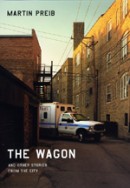 Chicago policeman Martin Preib wrote an acclaimed essay in the Virginia Quarterly Review a few years back, about being called to big up dead bodies at crime scenes. It’s now the title essay in a collection of pieces about his time on the beat.
Chicago policeman Martin Preib wrote an acclaimed essay in the Virginia Quarterly Review a few years back, about being called to big up dead bodies at crime scenes. It’s now the title essay in a collection of pieces about his time on the beat.
In one of Preib’s hometown papers, the Chicago Reader, Jerome Ludwig says of the book’s title essay: ““In it, Preib details his work on the vehicle the [Chicago Police Department] uses to pick up dead bodies. It seems incongruous to describe such a gut-wrenching story as gorgeous, but gorgeous it is; Preib’s musings on the recently, often ignominiously departed are particularly affecting, with flashes of morbid humor for relief.”
Reviewing the book in the Wall Street Journal, Daniel Horan, a fellow police officer, writes:
Police thrillers are so widely read and police dramas so commonplace on television that many people think they have a good understanding of what a cop’s world is like. But in truth that world is seldom revealed with anything approaching verisimilitude. We get it with The Wagon.
And in the Washington Post, Jonathan Yardley says the book is a particularly welcome addition to the shelf:
Preib’s is a voice that has almost never been heard in American writing: not merely the voice of an ordinary policeman, which is rare enough, but the voice of someone whose working life has been spent in the service industry, “the place for muddled worldviews, unclear ambitions, blunted desires, and other people who just never got it, or thought they had it but didn’t: the divorced, alcoholics, the new age philosophers, dopers, the indolent, the criminal.”
Yardley notes Preib’s stated appreciation of Walt Whitman and Herman Melville, and, in Preib’s words, his own “kind of faith that lingers in realism, a belief that knowing the city will lead somewhere beyond the city.” Yardley writes: “He has justified and realized that faith in The Wagon, a quite remarkable book that is much larger than its slender dimensions.”
The Wagon and Other Stories from the City by Martin Preib
University of Chicago Press, 176 pp., $20.00

